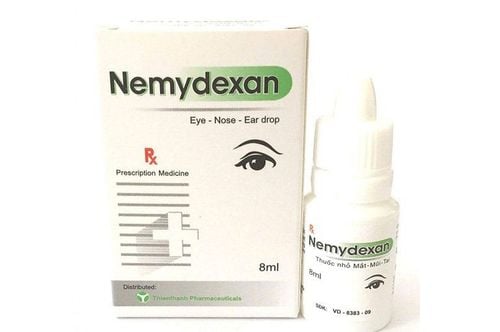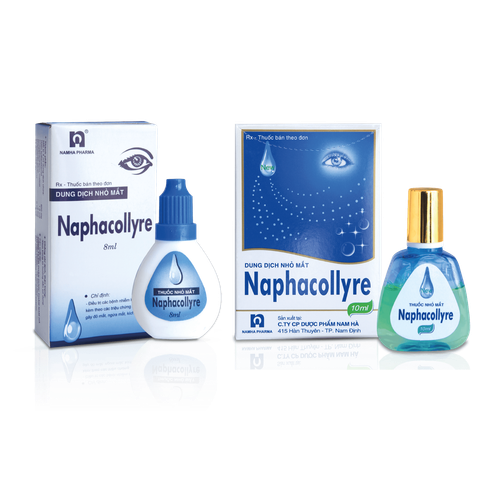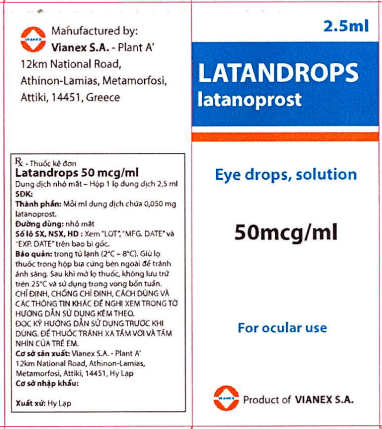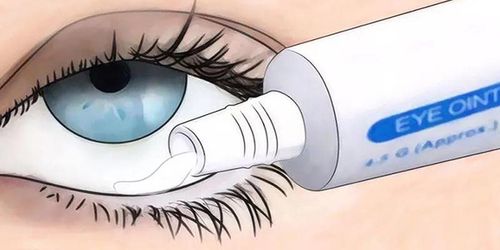This is an automatically translated article.
The article was professionally consulted by Specialist Doctor II Nguyen Thai Hung - Department of Medical Examination & Internal Medicine - Vinmec Danang International Hospital. Specialist II Nguyen Thai Hung has 13 years of experience as a doctor treating eye diseases.Acute conjunctivitis or pink eye is an inflammation or infection of the conjunctiva that causes the eyelids to swell and cover the eyeball. Although conjunctivitis can be uncomfortable, it rarely affects your vision. Treatments can help ease the discomfort of the disease. Because conjunctivitis can be contagious, early diagnosis and treatment can help limit its spread.
1. What is acute conjunctivitis?
Acute conjunctivitis, also known as pink eye, is an inflammation of the conjunctiva. Conjunctivitis occurs due to viruses and bacteria, so it is highly contagious and even outbreaks into an epidemic. The route of conjunctivitis infection is mainly by direct contact with mucus, eye rust of the patient or eye secretions, through intermediate items such as towels, glasses, washbasins...The disease is also contagious. Through breathing and saliva such as when talking close, coughing, kissing... Therefore, it is necessary to isolate patients with pink eye and take preventive measures to limit the risk of infection such as wearing a mask when contact with patients, wash hands thoroughly with antibacterial soap, do not share personal items...
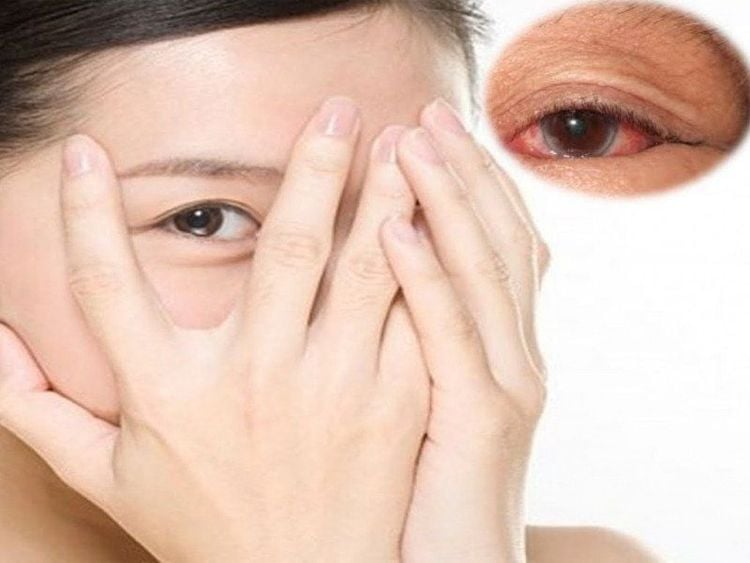
2. Causes of acute conjunctivitis
Viruses: Viral strains are the most common cause and are the most contagious. Most cases affect both eyes. The patient feels like something has entered the eye, causing watery eyes, pus discharge, red eyes, and swelling of the eyelids. Bacterial: Bacterial strains usually infect one eye but can occur in both. Your eyes will secrete a lot of pus and mucus. The patient has eyelid pain with a little discharge. Eyes look normal or slightly red. Allergies: Allergies cause watery, itchy, and red eyes in both eyes. You may also have an itchy, runny nose. The cause is unknown, but it is more common in people with asthma and eczema or those with persistent allergies. Patients experience repeated itching, thick pus, sensitivity to light, blurred vision, and discoloration of the eyes. Treatment should be prescribed by an ophthalmologist. Neonatal conjunctivitis: is a serious illness that affects newborn babies. The cause of conjunctivitis in newborns is difficult to determine because in many cases the symptoms are the same. Newborn conjunctivitis can be caused by a tear duct blockage, infection, or irritation when a tear is present. Use antibiotic eye drops at birth to prevent some diseases from the mother's genital tract to her baby. Giant papillary conjunctivitis: associated with long-term use of contact lenses or the use of artificial eyelids, causing large papillary lesions of the eyelids.3. Signs of acute conjunctivitis
Symptoms depend on the cause of the inflammation, but acute conjunctivitis can be diagnosed by the following:Redness of the conjunctiva or inner eyelids Swollen conjunctival Conjunctivitis More tears than usual Drainage: fluid Thick yellow discharge on the eyelashes, especially after sleeping. It can make it difficult for your eyelids to open your eyes when you wake up. Green or white discharge from the eyes Itching of the eyes More sensitive to light Swollen lymph nodes (usually due to a viral infection) Seek immediate medical attention with an eye specialist in the following cases:
There are many yellow or green discharge from your eyes, or if your eyelids are glued together when you wake up in the morning You have severe pain when you look at bright lights You have a high fever, shaking, facial pain or reduced eyesight.
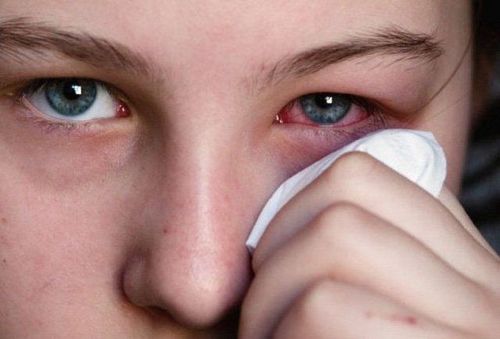
4. Diagnosis of acute conjunctivitis
Patients should not think that all symptoms of pink, irritated, or edematous eyes are conjunctivitis. Your symptoms could also be caused by seasonal allergies, styes, iritis, or blepharitis, which are all non-contagious causes.The ophthalmologist will ask you about your symptoms, examine your eyes, and possibly use a cotton swab to take some fluid from your eyelids for laboratory testing. That will help find bacteria or viruses that can cause conjunctivitis, including those that can cause STIs. The doctor can then prescribe the right treatment for the causative agent.
If your doctor tells you that you have acute conjunctivitis , you might ask these questions:
Is my pink eye contagious? If it's contagious, how do I avoid spreading it? Do I need to stay home from work or school?
5. Treatment of acute conjunctivitis
Treatment of conjunctivitis usually focuses on symptom relief. Your doctor may recommend using artificial tears, cleaning your eyelids with a wet washcloth, and applying cold or warm compresses several times per day.If you wear contact lenses, you will be advised to stop wearing them until they are completely healed. Your doctor will probably recommend that you throw away the contact lenses you already wear if your lenses are disposable.
Since conjunctivitis is usually caused by a virus, antibiotics won't work and can even cause harm by reducing their effectiveness in the future or causing a drug reaction. Instead, the virus takes time to disappear - two or three weeks at most.
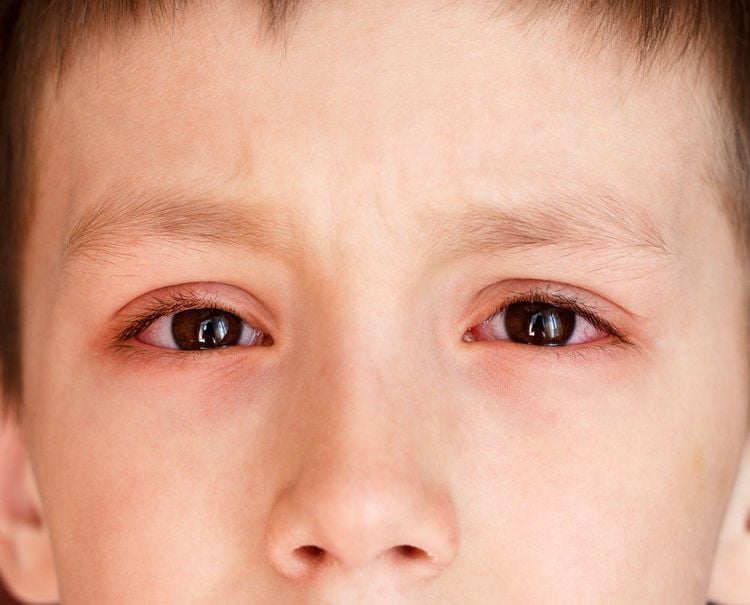
Eye Unit of the Department of Eye, Ear, Nose, Throat and Maxillofacial Department, Vinmec International General Hospital has the function of comprehensive eye and vision health care for children, adults and the elderly including children, adults and the elderly. check for refractive errors, physical examination, diagnostic ultrasound, laser treatment and surgery. In addition, the Eye Unit also has the task of coordinating with other clinical departments in the treatment of pathological complications and accidental eye injuries, including acute conjunctivitis
Please dial HOTLINE for more information or register for an appointment HERE. Download MyVinmec app to make appointments faster and to manage your bookings easily.
References: Mayoclinic.org and Webmd.com




